The Left Hand had detected a microscopic lowering of the horizon against the backdrop of stars, which did prove that the Planck worms had corroded the far side into vacuum hundreds of thousands of kilometers away. But the line of sight from the Left Hand to the new horizon still only penetrated twenty or so meters below the surface where the border would normally have been; the growing crater could be as shallow as that limit, or it could be a million times deeper.
Tchicaya waited. The fireflies could still wink out at any moment. The Left Hand’s engines weren’t powerful, and it carried only a small reserve of fuel, but it could adapt to a shift in the border’s velocity of a few meters per second.
After ten minutes, nothing had changed. The fireflies were still visible. The border was outracing them.
That did not mean that there was no hope left. But to move the Left Hand faster than the fireflies, to have any chance at all of catching the border, he would need the shuttle.
He was useless on his own, now. It all came down to three Preservationists, and whether or not the hint of life in the far side had been enough to change their minds.
Tchicaya woke his father with a tug of the hand.
"What is it?" His father squinted at him blearily, but then he smiled and put a finger to his lips. He climbed out of bed and scooped Tchicaya into his arms, then carried him back to his own room.
He put Tchicaya down on the bed and sat beside him.
"You can’t sleep?"
Tchicaya shook his head.
"Why? What’s wrong?"
Tchicaya didn’t need to have the truth coaxed out of him. "I don’t want to get older," he said. "I don’t want to change."
His father laughed. "Nine isn’t old. And nothing’s going to change tomorrow." It was his birthday in a few hour’s time.
"I know."
"Nothing’s going to change for you, for years."
Tchicaya felt a flicker of impatience. "I don’t mean my body. I’m not worried about that."
"What, then?"
"I’m going to live for a long time, aren’t I? Thousands of years?"
"Yes." His father reached down and stroked Tchicaya’s forehead. "You’re not worried about death? You know what it would take to kill a person. You’ll outlive the stars, if you want to."
Tchicaya said, "I know. But if I do… how will I know that I’m still me ?"
He struggled to explain. He still felt he was the same person as he’d been when he was seven or eight, but he knew that the creature of his earliest momeries, of three or four, had been transformed inside his skin. That was all right, because an infant was a kind of half-made person who needed to be absorbed into something larger. He could even accept that in ten year’s time, some of his own feelings and attitudes would be different. "But it won’t stop, will it? It won’t ever stop."
"No," his father agreed.
"Then how will I know I’m changing in the right way? How will I know I haven’t turned into someone else?" Tchicaya shuddered. He felt less dread now that he wasn’t alone, but his father’s mere presence couldn’t banish this fear entirely, the way it had banished the terrors of his childhood. If a stranger could displace him, step by step over ten thousand years, the same thing would be happening to everyone. No one around him would be able to help, because they’d all be usurped in exactly the same way.
His father conjured up a globe of the planet and held it toward him, a luminous apparition painted over the gray shadows of the room. "Where are you, right now?"
Tchicaya turned the globe slightly with a gesture, then pointed to their town, Baake.
"Here’s puzzle for you," his father said. "Suppose I draw an arrow here, on the ground in front of you, and tell you it’s the most important thing there is." He marked the globe as he spoke. "Wherever you go, wherever you travel, you’ll need to find a way to take this arrow with you."
This was too easy. "I’d use a compass," Tchicaya said. "And if I didn’t have a compass, I’d use the stars. Wherever I went, I could always find the same bearing."
"You think that’s the best way to carry a direction with you? Reproducing its compass bearing?"
"Yes."
His father drew a small arrow on the globe, close to the north pole, pointing due north. Then he drew another on the opposite side of the pole, also pointing due north. The two arrows shared the same compass bearing, but anyone could see that they were pointing in opposite directions.
Tchicaya scowled. He wanted to claim that this was just a perverse exception to an otherwise reasonable rule, but he wasn’t sure that was the case.
"Forget about north and south," his father said. "Forget about the stars. This arrow is your only compass; there is nothing else to steer by. You must take it with you. Now tell me how."
Tchicaya stared at the globe. He drew a path leading away from Baake. How could he duplicate the arrow as he moved? "I’d draw another arrow, each time I took a step. The same as the one before."
His father smiled. "Good. But how would you make each new one the same?"
"I’d make it the same length. And I’d make it parallel."
"How would you do that?" his father persisted. "How would you know that the new arrow was parallel to the old one?"
Tchicaya was unsure. The globe was curved, its geometry was complicated. Maybe it would be simpler to start with a flat surface, and then work his way up to the harder case. He summoned a translucent plane and drew an arrow in black. On command, his Mediator could duplicate the object faithfully, anywhere else on the plane, but it was up to him to understand the rules.
He drew a second arrow and contemplated its relationship with the first. "They’re parallel. So if you join the two bases and the two tips, they make a parallelogram."
"Yes. But how do you know that they make a parallelogram?" His father reached over and skewed the second arrow. "You can tell that I’ve ruined it, just by looking, but what is it that you’re looking for when you see that?"
"The distances aren’t the same anymore." Tchicaya traced them with his finger. "From base to base and tip to tip, it’s different now. So to make the second arrow a copy of the first, I have to make sure that it’s the same length, and that its tip is as far away from the first one’s tip as the bases are from each other."
"All right, that’s true," his father agreed. "Now suppose I make things more difficult. Suppose I say you have no ruler, no tape measure. You can’t measure a distance along one line and duplicate it on another one."
Tchicaya laughed. "That’s too hard! It’s impossible, then!"
"Wait. You can do this: you can compare distances along the same line. If you go straight from A to B to C, you can know if B is exactly half the journey."
Tchicaya gazed at the arrows. There was no half journey here, there was no bisected line in a parallelogram.
"Keep looking," his father urged him. "Look at the things you haven’t even drawn yet."
That clue gave it away. "The diagonals?"
"Yes."
The diagonals of the parallelogram ran from the base of the first arrow to the tip of the second, and vice versa . And the diagonals divided each other in two.
They worked through the construction together, pinning down the details, making them precise. You could duplicate an arrow by drawing a line from its tip to the base you’d chosen for the second arrow, bisecting that line, then drawing a line from the base of the first arrow, passing through the midpoint and continuing on as far again. The far end of that second diagonal told you where the tip of the duplicate arrow would be.

Читать дальше
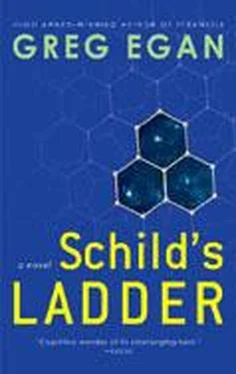

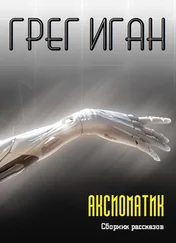
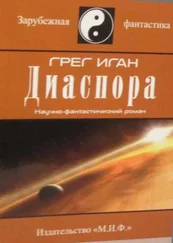
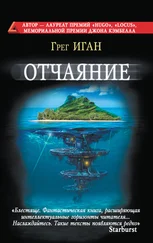
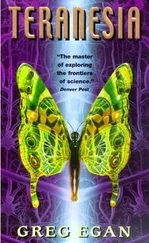
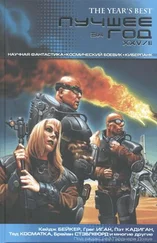
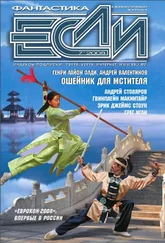

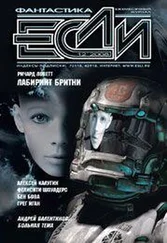
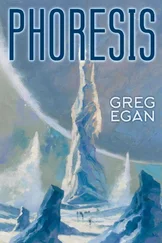
![Грег Иган - Рассказы [компиляция]](/books/419837/greg-igan-rasskazy-kompilyaciya-thumb.webp)
